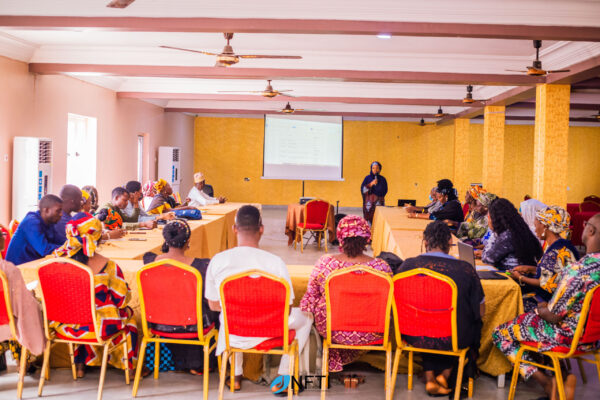The Natview Foundation for Technology Innovation (NFTI) recently organized a one-day peer learning review session with health facility in-charges and pharmacy technicians from Kaduna South and Chikun local government areas. This session was held following six rounds of visits conducted as part of NFTI’s longitudinal study. The aim was to foster peer learning, validate data, discuss challenges, and explore best practices for improving health service delivery.
The session began with opening remarks from Dr. Bosan, Health Secretary of Chikun Local Government, who welcomed participants and commended NFTI’s efforts in gathering critical data to enhance health systems. Following a brief round of introductions, Fatima Tafoki, Senior Program Manager at NFTI, provided an overview of NFTI’s work and the purpose of the longitudinal study. She emphasized that the study seeks to understand patterns in health workforce availability and supply chain management (SCM) within primary healthcare centers (PHCs). Additionally, it aims to uncover discrepancies in health data reporting, ensuring more accurate and actionable insights for decision-making at the state level.
The NFTI team presented key findings on HRH and SCM, highlighting significant trends observed during data collection. To encourage active participation and critical analysis, attendees were divided into groups for discussions on data validation, existing challenges, and potential solutions. Each group deliberated on specific issues affecting healthcare delivery in their respective facilities, leading to insightful conversations about the realities on the ground.
Among the major challenges raised was the shortage of pharmacists and midwives, which has serious implications for maternal and child healthcare. Participants noted that the lack of trained personnel in labor and delivery units could negatively impact maternal mortality rates. Furthermore, discussions emerged around stock balance calculations and inventory management, with concerns that inaccurate reporting could affect the availability of essential medicines. The NFTI team emphasized the importance of ensuring that NFTI data champions receive accurate and timely information to reflect real stock levels.
Participants also shared best practices that have worked in their respective facilities, providing valuable peer-to-peer learning opportunities. They discussed ways to improve coordination between facility staff and data champions, ensure better documentation of stock movement, and advocate for increased staffing in critical areas such as midwifery and pharmacy services.

After the deliberations, NFTI’s Senior Program Officer reassured participants of the foundation’s commitment to continuous data collection and analysis. She emphasized that the foundation will maintain its biweekly review exercises, with four more rounds of visits planned before the final peer learning session. The insights gathered from this study will be compiled and shared with relevant health sector stakeholders, enabling data-driven decision-making to strengthen Kaduna’s primary healthcare system.
The session ended with expressions of appreciation from participants, who acknowledged the value of peer learning in enhancing health service delivery. NFTI reaffirmed its role in identifying systemic issues and recommending evidence-based solutions to the state government. The representative from the Kaduna State Health Supply Management Agency (KADHSMA), Pharm. Mansur Halidu also thanked the participants for their engagement and assured them that their feedback would be instrumental in shaping future health interventions.

